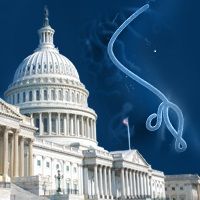EBOLA: Troops Quarantined; Dallas Nurse Cured
The US military is quarantining troops returning from West Africa for 21 days. But in a sign of continuing disagreement between public health experts, state governors, and the Obama administration, the military isn't calling it a quarantine. The official military term is "controlled monitoring." Four states now have enacted quarantines for people returning to the US after caring for Ebola patients: New York, New Jersey, Illinois, and most recently Connecticut. Meanwhile, Dallas nurse Amber Vinson is pronounced free of the Ebola virus and released from Emory University Hospital in Atlanta, GA.

The US military is quarantining troops returning from West Africa for 21 days.
But in a sign of continuing disagreement between public health experts, state governors, and the Obama administration, the military isn’t calling it a quarantine. The official military term is “controlled monitoring.”
They were released by the US Centers for Disease Control and Prevention (CDC) in a 10-page
Oct. 27.
Four states now have enacted quarantines for people returning to the US after caring for Ebola patients: New York, New Jersey, Illinois, and most recently Connecticut.But the Obama administration opposes such restrictions, preferring a tiered system of monitoring based on apparent risk.document The CDC recommendations are suggested and voluntary, with final policy decisions ceded to the states.
Discussing the federal policy recommendations, CDC Director Thomas Frieden, MD, said the new rules are based on science.The CDC maintains that Ebola is less contagious than many pathogens, including flu viruses, and that infections can be successfully treated if caught early.
That includes the case of Amber Vinson, 29, the Dallas nurse who is being released from Emory University Hospital and will appear at a news conference this afternoon. The hospital issued a statement saying Vinson is free of the virus, which she contracted while caring for Thomas Eric Duncan, the visitor from Liberia who died Oct. 8 of Ebola infection at Texas Presbyterian Health Hospital.
But the four quarantine states are taking a harder line—one critics say is based on fear, and perhaps on convincing voters that their politicians are protecting them.
The US military also is refusing to take chances. CNN is reporting that 30 US soldiers returning from West Africa will be quarantined in Italy, joining Army Major General Darryl Williams and 10 other military personal already under a quarantine. They are in a US military installation at Vicenza, Italy.
In writing about the Connecticut quarantine, enacted yesterday, the Hartford Courant interviewed Yale School of Public Health doctoral student Ryan Boyko, 30 who spent three weeks in Liberia working on a computerized disease tracking system
Boyko’s only potential Ebola exposure was a brief Sept. 29 conversation in Liberia with Ashoka Mukpo, the NBC cameraman who accompanied NBC medical editor Nancy Snyderman, MD, to the Ebola hot zone for a story. Mukpo later became ill with Ebola, was flown to the University of Nebraska Medical Center, and recovered several weeks later. Boyko, who arrived home Oct. 11, later developed a fever and diarrhea and was hospitalized in an isolation unit at Yale-New Hospital. Tests for Ebola came back negative and after three days in the hospital doctors told him on Oct. 18 he could go home without having to remain isolated. But under the state’s new quarantine policy he was later told he would have to be quarantined, so he remains in confinement at home through Oct. 30. “The walls of your own house start to feel like a prison,” he said.
Four quarantines have been issued in CT, the Courant reported.
But the US quarantines stop far short of what’s happening in Australia. That country has announced it will no longer issue visas to travelers attempting to enter the country from the West African nations where Ebola is raging. The BBC reports that Australia’s Immigration Minister Scott Morrison told the country’s parliament that the travel ban included cancelling any temporary or non-resident visas for West African travelers who have not left their countries yet. The country is also issuing 21-day quarantine orders to all people arriving from those countries who have permanent visas.